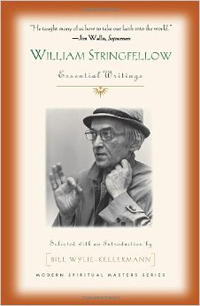Book Notes
 Bill Wylie-Kellermann, editor, William Stringfellow, Essential Writings (Maryknoll: Orbis, 2013), 234pp.
Bill Wylie-Kellermann, editor, William Stringfellow, Essential Writings (Maryknoll: Orbis, 2013), 234pp.
William Stringfellow (1928–1985) was an American lay theologian and street lawyer who just might have been the most important Christian voice of radical dissent in his generation, even though many people have never heard of him. He was indicted for harboring Daniel Berrigan. He prayed a public exorcism of Nixon. He was booed at the first conference on religion and race in 1963 (!) for saying that it was "too little, too late, and too lily white." He was the youngest participant and only non-academic invited to participate in Karl Barth's 1962 visit to America. His concern, he liked to say, was to understand America biblically, as opposed to understanding the Bible Americanly.
Stringfellow matriculated at Bates College when he was fifteen, after which he studied for a year at the London School of Economics and served for two years in the US Second Armored Division. After graduating from Harvard Law School, in 1956 he moved to the tenements of Harlem and practiced street law among the poor. There he worked out his vision of the Christian vocation in the world, which for him meant a struggle against what the apostle Paul called "the principalities and powers" of this world (Ephesians 6:12).
Stringfellow read the Bible with a post-critical naiveté that offended both liberals and conservatives, whether religious or political. The principalities and powers of modern life are the fallen ideologies and institutions in society that exercise the dominion of death over us. These powers are nothing less than demonic. They come in endless forms and varieties — corporations, the military, money, government, science, sports, media, technology, and even the church. And so Stringfellow called believers to recognize these powers of the bondage of death, to resist and denounce them, and to choose the resurrection life offered by God in Christ. In the shadow of death, we're called to choose life.
This is the second Stringfellow anthology by Kellerman, after his 1994 collection called A Keeper of the Word. Together they're an excellent introduction to Stringfellow's 15 books. The book concludes with a "homiletical afterword" by Daniel Berrigan that he gave at Stringfellow's funeral in March of 1985, and a "Stringfellonian Lexicon" of important terms (Antichrist, Babel, Baptism, Conversion, Devil, etc.).


